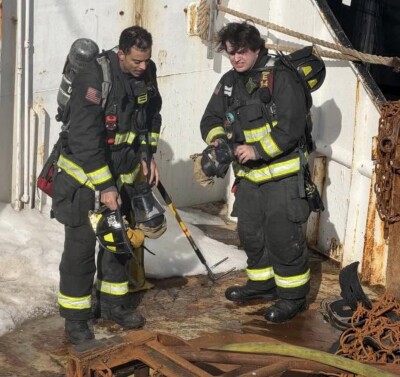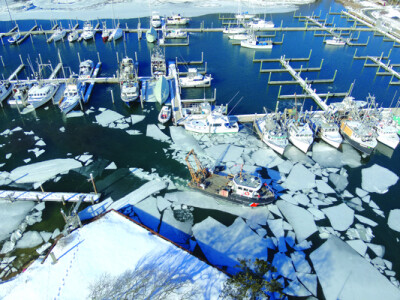Not going overboard
From U.S. Coast Guard reports.
Any fisherman worth his salt knows the corrosive effects of seawater, whether you've replaced electronics more times than you'd like to count or jury-rigged your gear to keep your extremities dry and, hopefully, warm. The ultimate hazard of the sea, however, is being immersed in it.
Falls overboard account for 23 percent of commercial fishing fatalities. Running drills, having the equipment and being prepared at a moment's notice to use that equipment are key to recovering an overboard crew member. However, the gear you have on could determine your survival in a matter of moments.
On a December morning, a 67-foot, 97-gross-ton steel-hulled crabber departed an Oregon port with six crew members. Two days later, the boat was headed north-northwest at about 6 knots. The air was 47 degrees, winds out of the northwest at about 25 knots, and seas were 8 to 10 feet. The skipper was in the pilothouse. One crewman was baiting pots and two crewmen were setting the pots from opposite sides of the stern. Two members of the crew were sleeping below.
A larger than average wave hit the vessel and covered the crewmen in white water, knocking them to the deck. When two of the crew recovered, they discovered the crewman on the starboard quarter had been washed overboard.
Immediately they began shouting "man overboard" and retrieved a life ring to throw to the victim, but couldn't get it close enough to him in the water.
The skipper backed down and tried to turn the vessel immediately to get within reach of the man overboard. The skipper sounded an alarm and yelled to wake the sleeping crew members to help with the rescue attempt. The crew made several attempts to get a life ring to the victim, but they came up short each time.
When the vessel got closer to the victim, the crew was unsuccessful in trying to reach him with a buoy pole. The victim appeared to be trying to swim or tread water, but within a matter of minutes, he slipped underwater and out of sight.
The skipper notified the Coast Guard of the accident.
Lessons learned
During the investigation of this incident and interviews with the crew, it was determined that the victim was wearing rain gear with bib-type pants, but no PFD. It was also believed he had fastened his rain pants around his boots to keep the water out. This probably prevented him from being able to remove his boots and rain gear. Without the aid of flotation, he was unable to swim or tread water for very long.
Information collected after the incident showed the vessel had recently completed a Coast Guard dockside fishing vessel safety examination and was in compliance with all safety requirements. The skipper had been conducting emergency drills as required, and had held a drill about a week before they got underway on this fishing trip. This boat had all the required safety equipment onboard, and the crew was trained to handle emergency situations.
The best way to increase your chances of surviving a fall overboard is to wear a PFD, available in many types and sizes. It may take some trials to find one that does not interfere with your movement or the job you need to perform, as each fishery poses unique hazards.
Captains must determine when conditions require a PFD, whether it's working on an open deck, when the going becomes rough, or crossing a bar. Each member of the crew must also take responsibility for his or her safety.
Be aware, be prepared, and be a survivor. Fish safely: www.fishsafe.info.






